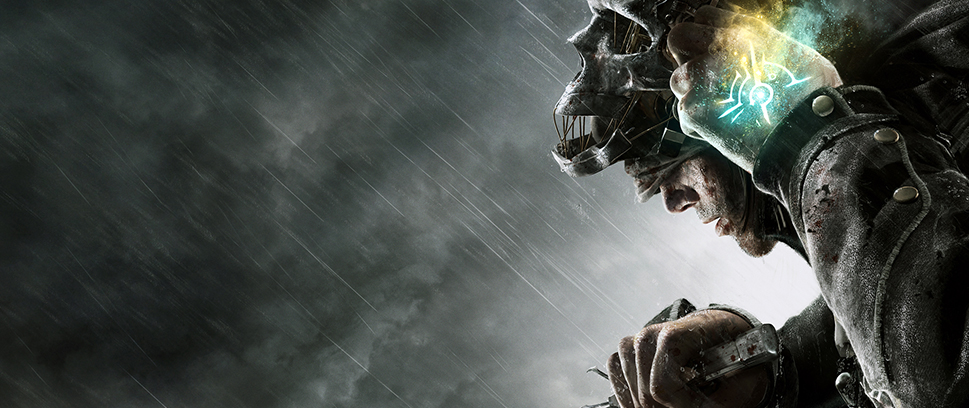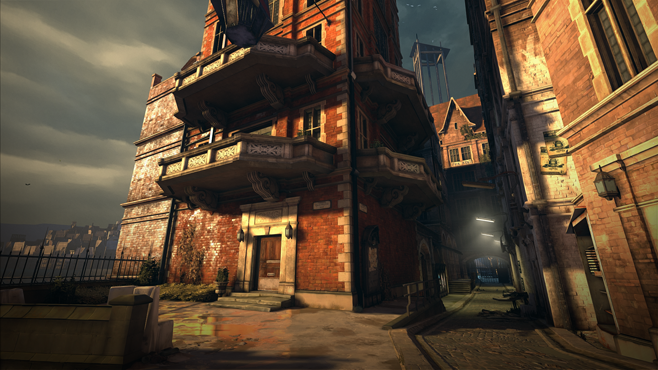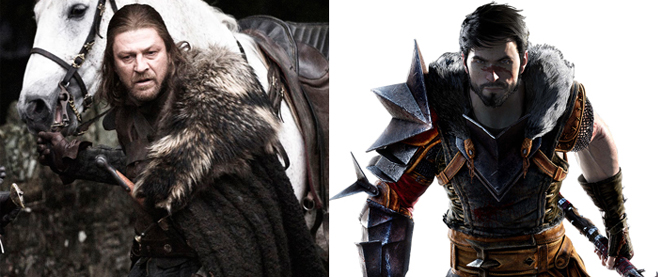
Abuses of Power
I went back to Dishonored some time after finishing it and skulked around on exposed industrial piping and lampposts, turning myself, as the vengeful assassin Corvo Attano, into a brooding, silent observer over the rotten cobblestone streets of Dunwall. Unlike my last visit, this time I was not here for bloodletting. Instead, my mission was an unnoticed vigil spying on what remained of the city’s citizenry – mostly gang members and petty thugs – and the totalitarian foot soldiers of the Orwellian-cum-Victorian city night watch. I was there to test and tinker with Dishonored’s AI systems, to see what they did when they thought I wasn’t around, to provoke and harass (and yes, sometimes puncture their necks with my blade – a little unexpected violence is sometimes necessary to trigger a response) and look at their reactions as test subjects in my own loosely controlled study.
[pullquote]There’s a lot of developer-manufactured history languishing in the city’s dismal European architecture.[/pullquote]
I was not there to gather narrative reconnaissance. There’s already a lot of developer-manufactured history languishing in the city’s dismal European architecture, plainly readable in propagandistic signage mandated by the tyrannical Lord Regent and jotted down in scribbled notes you discover that detail in novelist strokes a range of grounded political, religious and scientific foundations. Take Corvo’s supernatural powers. They’re a forced gift after a fashion from the Outsider, a mythic figure the ancestors of Dishonored’s modern-day society supposedly worshipped alongside the leviathan whales (who as it happens are also notable for the oil humans harvest from them to power Dunwall’s economy.)
The city is just as storied. You can picture it in the vein of the sweeping eagle-eye lens of Westeros that opens Game of Thrones: here lies Dunwall, capital of the island of Gristol, part of the imperial empire of The Isles, Westward from the massive far Eastern continent of Pandyssia, evidence of a newer civilization haphazardly constructed on the bones of another and part of a larger world only hinted at. There isn’t time to visit all of these global locales, doomed to live merely in the art direction as cartographic volumizers to Dishonored’s busy linear trail. For now. They’re firmly established for a reason, you’d guess, sponging up what might be an unhealthy preoccupation with lore.
Inside the city limits there are all sorts – the squalid and the working class and the nobles that you overhear or absorb in conversation, adding color to Dunwall’s sordid backdrop as the levels themselves do through environmental storytelling.

With hushed tones a patrician claiming to be Lady Boyle’s lover pulls you aside, begging for her life – incidentally you’ve infiltrated a lavish masquerade ball the Boyle estate is throwing to do something considerably less agreeable – he suggests an alternative fate of lifelong exile. “I’m sure she’ll come to appreciate me in time,” comes his questionable justification. I’ll let you work out the gray areas there.
Then there are the maid and guardsman making an honest wage cleaning and protecting Dr. Galvani’s house on Clavering Boulevard. As you may discover in private conversation, they are actually a couple, revealed in a quaint anecdotal exchange that’s easy to miss if you blindly sprint in a-stabbing. And oh, Samuel, the abused boatman; his living quarters are a cramped few-by-few foot shanty-closet outside the Hound Pits pub, the boozy headquarters of the loyalist rebel force (also Sam’s comrades, supposedly) who give Corvo his orders to take vengeance on those in power that framed him so they might usurp control themselves. These intertextual commentaries are as common as the hagfish in the foul gray-green waters outside the Hound Pits, and for all the good they do beefing up the marrow in what’s otherwise a dispiritedly straightforward videogame revenge plot, they do make Dishonored a bit literate – I was never able to quite shake the suspicion that this universe, inspired by sci-fi steampunk, would have been more fun as a book. It is a literary game for all the wrong reasons.
[pullquote]I was never able to quite shake the suspicion that this universe would have been more fun as a book. It is a literary game for all the wrong reasons.[/pullquote]
Unfortunately when you actually stop to consider your controller all that peripheral dramatis is entombed in an echo chamber, and that makes actual gameplay a lot more stubborn and messy. Consider for a second what the Outsider gives you: the power to be a raging badass in an ornate hooded duster. It’s your choice how you want to act – flimsy narrative be damned – though it’s clear what demeanor Dunwall is at surface-level best suited for.
———
I like stealth games, or at least the idea of them. Ever since the original Metal Gear Solid any time a designer gives me the ability to sneakily fool around with its gameplay parameters I usually take it. When I am Corvo, roleplaying as a loud, crass agent of chaos is unnatural. Blink-teleporting into a group of guards, violently slitting the throats of one or two and finishing the rest off with a lightly hefted grenade or a few well-placed flintlock shots to the face feels almost wrong when I can just as easily beam from a secluded archway into the sodden streets to quietly forfeit the watch one by one. Still, I felt empowered enough to slaughter any and all opposition I found through most of the game, and did. Why?
I had hoped to test the limits of Dishonored’s stealth as I sat perched on various building overhangs and rooftops, looking down on my quarries going about their business. I wanted a measurement in variability of what might happen from one scenario to the next when seen or caught. The easy way alert psyches would lift left a bad taste in my mouth the first time around, and as I kept prodding – distracting, testing the limits on lines of sight and so forth – I found the results of plying my crudely medieval Voight-Kampff methods increasingly inconclusive. “Probably rats,” a masked Overseer mutters as I try to break the game’s stealth binaries just a little further by blinking within his visible cone. “Into everything.” They barely ever seem to even look above them – the dreaded Arkham Asylum problem.

My failed experiment reminds me of watching a friend play Deus Ex: Human Revolution. After having his cover blown (likely the result of some obtuse detection error), the balls-out strategy to survive quickly devolved into a straightforward firefight on the legion of enemy combatants now GPS-swarming on Adam Jensen’s position. Standing in the doorway of a Detroit slumhouse, my friend unloaded as the enemies distressingly began to line up one after another, filing in as though eagerly waiting to walk into the reaper’s open jaws. Not one bothered to leave the doorway. If I could’ve been embarrassed for artificial intelligence then, I would have. The tactical prowess on display was so poor no foe fired their weapon. I could almost see the command path synapses misfiring. It effectively broke the game for me.
I had flashbacks of that little scene when fixated in some dark corner on the haphazard “alert” lines that blink and glow solid above a target’s head when you’re found out. There were at least a few times when a hapless patrolman didn’t see me after I directly bumped into them (once the poor bastard was at full alert). Caught in the act I’ve witnessed guys completely lose sight of my very existence in less than five seconds. It’s hit-or-miss – quite disheartening.
[pullquote]Maybe asking for more than basic AI functions is a tall order when your game is open-ended enough to order carte blanche from either the League of Shadows or Waistcoat Commando.[/pullquote]
Ok, maybe some old stealth-claret will do the trick, then. No? There’s usually collateral splatter, but for Corvo, undetected kills are quickly delivered with the joyless precision of a machine. (They have about the same effect on your own emotional state, too.) Nor can you expect to always run afoul of someone’s attention – when experimenting I came across an opportunity to get a jumping kill, in which you forcefully lodge a blade into an unsuspecting sentry’s pharanx. When I did, his pal walking less than two feet out in front forgot to even turn around. (He, too, fell without incident.)
Back to Corvo the almighty (or not – you can still fall in seconds and guzzle health elixirs with an alcoholic fervor). Maybe asking for more than basic AI functions is a tall order when your game is open-ended enough to order carte blanche from either the League of Shadows or Waistcoat Commando. Is this a stealth game? Not really. Blink makes Corvo into too much a superhero or villain, mask and all, to really achieve the vulnerability and fight-or-flight necessity of a pure stealth experience. You’re encouraged to prowl at your leisure, owning Dunwall as you see fit as whatever kind of mechanically-masked Dark Knight you want to be. You’ve been given the keys to the plague-ridden kingdom, more or less – are you the kind of player to run amok with demonstrably bloodstained hands or will you avoid confrontation altogether?
The alternative (there’s little room for middle ground here) is turning Corvo into a decidedly less elegant sort of assassin. It can be mischievously fun to cruelly kill and maim at your own insane discretion, should you go that way, setting up tripwire traps and rewiring security to turn on your foes and the cartoonishly deplorable ways you may displace enemy troops or civilians from their limbs.

Actually most of your powers are actually geared towards more brutal ends, a sometime contradiction against the hide-and-seek playground Dunwall seems to offer. But you can only watch a fresh corpse being ripped apart by a swarm of festering disease rats so many times before its value starts to wear thin.
Of course, this raises the singularly videogame-y quandary of how to keep death and destruction fun, or at least worthy of our attention. Dishonored is a bit more Crysis than Far Cry 2 – its wish is that you frolic around in its drearily absorbing universe rather than ponder some greater academic agenda. Assuming total control of Corvo abandons the pretenses of its textbook detail, too. The contrast between basic gameplay and unearthing worldly backstory is so jarring I became disinterested in reading up on the past chronicles of Dunwall almost immediately, in spite of a somewhat growing interest in this aesthetic universe. In popcorn fare the solution is usually adrenaline-pumping setpieces, or in lieu of that, just to make battling that much more engaging.
Here that’s perhaps not the case. Like the mechanical execution of stealth kills, direct confrontations with sword and pistol alike lack impact. What should in theory be a great and bloody counterpoint to any literary face simply feels flat. An out-of-sight approach was dull – on the other hand, contentious encounters left me tepid. For all Corvo’s power, there must be something to focus on, right? There was; I began taking out my irritations on every NPC I crossed paths with. The contradictions left me confused about player and role-playing states:
Who am I?
Who is Corvo?
What the hell am I doing, really?
So I devolved into a frustrated, sadistic sociopath. (The power of player agency!)
———
Compared to a spattery violence ballet like Bulletstorm, whose gameplay schtick gleefully, artfully, crassly challenges you to commit the most heinous and ridiculous acts you could hope to ask for with a whip, a sawed-off and one of Battle Royale’s explosive collars, Dishonored is tame, so taking my revenge on the game was mostly bitter and not so sweet. It’s hardly titillating to systematically wipe out what I imagined were Dunwall’s remaining gentry, all attending Lady Boyle’s heavily guarded soiree – no easy feat considering an alert phase is akin to precipitously diving headfirst into a wall of bullets in a cover shooter – I did it anyway. Guests knelt cowering on the floor as I went from room to room cutting tracheas, powerless for all their money and influence to do anything against the wanton whims of such a madman. I saved the good Lady for last, first putting her to sleep and then to my chagrin, watching her body unenthusiastically become a lifeless, flame-retardant ragdoll when I tossed it in one of the Boyle mansions’ crackling hearths.
If the designers had wanted us to take any authentically perverse pleasure in this they would have indulged in more graphic detail, although this is hardly the point; had my masked mark screamed in agony when I threw her in the fireplace, I probably would’ve been severely unsettled in the same way I was throwing knives into the vital organ points of random mercenaries so many years ago in Soldier of Fortune 2. As my body count mounted, I wished even a run-of-the-mill altercation held the illusion of greater stakes. I probably shouldn’t have needed to paste my own blue-blooded genocide novel on top of such a game-y template.

Another curveball: grudgingly as I proverbially burned down the Boyle estate (sadly there are some limitations to the terror you wreak) I had to acknowledge the impressiveness of the art direction. I love it when games experiment with art, really; El Shaddai and Killer 7 and Limbo and Antichamber all have wonderfully evocative visual styles. Dishonored’s stylized Dickensian-oil-painting-meets-Team Fortress 2 aesthetic came to life amidst the regalia of Dunwall’s upper crust, all caparisoned up and adorning ghastly masks in supposed celebration of some sort of horrifying antediluvian Gods (like as ourselves).
Lady Boyle’s mask in particular struck me, her stoic face simultaneously angular and attractive, cold and porcelain, capable of betraying any expression in varied lighting. With the air of grotesque and mystery haunting the Boyle manse I felt, before blood started pooling on the marbled floors, that I was part of some droll party game – I could’ve been catching a killer rather than playing one. The visual realization made me angrier. The gutted denouement of Dunwall’s aristocracy didn’t feel any more satisfying.
[pullquote]The gutted denouement of Dunwall’s aristocracy didn’t feel any more satisfying.[/pullquote]
It happened again later when I was slogging through the sunken underbelly of the flooded Rudshore financial district. I came across a group of tallboys – stilt-legged chickenwalkers powered by whale-oil batteries lodged in the back of their towering mechanical chassis – eerily surveying an ashen lot buttressed by a handful of derelict buildings on either side. They might as well have been mechanized ghosts, trundling around with massive blindingly white headlamps. Dishonored becomes better at these non-setpieces as the game wears on. Despite a spectral hint of familiarity (visual design director Viktor Antonov previously created Half-Life 2’s similarly striking City 17) for a solemn moment the game finds a rare moment of nuanced dread here, silent but for the soft crunch of the tallboys’ feet as they make their rounds.
What a shame.
———
Plug in these disparate factors and Dishonored feels distressingly incongruous. I want to enjoy being Corvo – who doesn’t desire the power to go almost anywhere instantaneously whenever you want? – Design, on the other hand, seems more keen on ripping me apart. Violence is encouraged with your powers, concealment with the world, neither is satisfying; Dunwall teems with player paradoxes. Here is an interesting world with few incentives to be there, one whose emergent tales eschew consequence as they sadly evade the breadth of their own potential. Had Dishonored been a film instead of a game, it seems unlikely that it would’ve been so lucky in escaping criticism for failing to fully utilize such an intriguing space.
The question then, if there is one, is where you find yourself. Maybe you’ve succumbed to some insane displaced bloodlust as I did. Or you could just be going through the motions like I also dejectedly, repeatedly felt. Corvo may be a direct duelist or a soundless spectre. He doesn’t ever really get to realize either. The power structure just works too much like being stretched over the rack, as the British were so fond of doing at one point in time, albeit not as painful. Like Dunwall itself, Dishonored is too often a confused experiment on control run amok, and, without quite breaking, is maybe more disappointing for it.
———
Follow Steve Haske on Twitter @AfraidToMerge.




